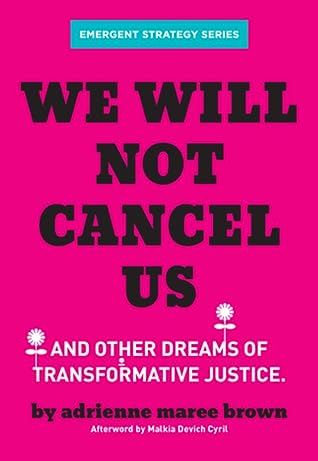More on this book
Community
Kindle Notes & Highlights
Read between
May 12 - May 24, 2025
I have a vision of movement as sanctuary. Not a tiny perfectionist utopia behind miles of barbed wire and walls and fences and tests and judgments and righteousness, but a vast sanctuary where our experiences, as humans who have experienced and caused harm, are met with centered, grounded invitations to grow.
Can we release our binary ways of thinking of good and bad in order to collectively grow from mistakes?
Instant judgment and punishment are practices of power over others. It’s what those with power do to those who can’t stop them, who can’t demand justice. This injustice of power is practiced at an individual and collective level.
Unless we have an analysis of abolition and dismantling systems of oppression, we will not realize what’s in our hands, we will never put the predator’s tools down and figure out what our tools are and can be.
But how do we believe survivors and still be abolitionist? And still practice transformative justice?
We end up putting more of our collective attention on punishing those accused of causing harm than supporting and centering the healing of survivors, and/or building pathways for those who are in cycles of causing harm to change.
Conflict, and growing community that can hold political difference, are actually healthy, generative, necessary moves for vibrant visions to be actualized.
I can’t help but wonder who benefits from movements that engage in public infighting, blame, shame, and knee-jerk call outs? I can’t help but see the state grinning, gathering all the data it needs, watching us weaken ourselves.
It doesn’t make sense to say “believe all survivors” if we don’t also remember that most of us are survivors, which includes most people who cause harm.
Online, we perform solidarity for strangers rather than engaging in hard conversations with comrades.
I want us to adapt from systems of oppression and punishment to systems of uplifting and transforming.
Through my own personal healing, I have learned to recognize the difference between a situation that is genuinely unsafe and one that is simply uncomfortable.
Accountability isn’t punishment, though it is frequently wielded as such. But, when we are able to discern between what our triggered bodies say and what our grounded bodies do, we can build the kinds of systems and practices we need to align our leadership and our movements. This is a spiritual alignment as much as it is a political one.
As an abolitionist and as a survivor and as someone that has caused harm in the world as well as been a vector for healing, I have deep compassion for those who seek to use their voices to name harm rather than look to the criminal justice system.
The way forward is to forge abolition with both hands in the dirt, building empathy in the mirror; it’s to remember that innocence is never a prerequisite for human dignity, nor for human rights and freedom;


